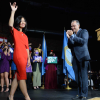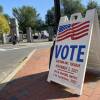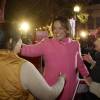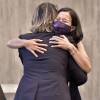As Boston voters cast their ballots for city mayor on Tuesday, both candidates made brief appearances on GBH’s Boston Public Radio.
In separate interviews, councilors Michelle Wu and Annissa Essaibi George discussed some Election Day rituals (wearing a lucky T token necklace and a visit to Morning Star Baptist Church, respectively), their feelings on the city’s historically dismal voter turnout, and what it was like sharing the ballot-casting moment with their school-age boys.
“I remember in September I sort of scurried ahead and did it,” Essaibi George said of the city’s preliminary election two months ago. Her vote Tuesday, on the other hand, she described as “pretty special.”
“I took that deep breath, brought them over, showed them the ballot before I filled in [the bubble] right next to my name,” she told hosts Jim Braude and Margery Eagen.
Meanwhile, Wu said she was grateful that the allure of cookies was a strong enough incentive to get the youngest of her two boys out of bed after a string of particularly late nights.
More Local News
“The little one has gotten a little off-schedule,” she explained. “His older brother had to remind him that there would be, quote, ‘cookies and stuff.’ The bake sale saved us; it got us out the door,” she joked.
On a less jovial note, both candidates were asked to address Secretary of State Bill Galvin’s Monday prediction that a depressingly low 30 percent of registered Boston voters will make their voices heard this election cycle.
“We’re working to gin that up today, and to hopefully prove that wrong,” Wu said. “We’ve sent out waves of our volunteers out on the doors, making phone calls” and sending plenty of text messages.
In the long term, Wu cited concerns about barriers to voting including the 20-day voter registration deadline and lack of a federally mandated voting holiday. She was optimistic, however, that in-person early voting and the option for mail-in balloting — both firsts for the city this time around — would help bring people in.
“We’re making steps,” she said.
Asked the same question, Essaibi George said she’s empathetic for the ways COVID-19 continues to upend daily life for Bostonians. She added that she and other officials need to do more to engage residents to take part in elections and civic engagement “beyond Election Day.”
Regardless of who comes out ahead, the winner of Tuesday’s election will become the first duly elected woman to lead the city, following acting Mayor Kim Janey’s eight-month tenure.
“As much as this is a historical moment, I really think about the future,” Essaibi George said, “and the work that we have to do.”
Wu, who first announced her campaign for mayor back in October 2019, said she hasn’t had much time to consider the historic implications.
“I was trying to have a conversation with my sons last night about what this could mean, and what Election Day was for,” she said. “It was even hard to put into words, thinking about what their future might be like. And they kind of summed it up when we asked them ‘OK, what is mama trying to do?’ And they said, ‘Help people.’”
“That’s the focus,” she said. “That’s what all of us should be doing in this moment, ‘cause we need all hands on deck.”
For residents who’ve yet to cast their ballots, polls are set to close at 8 p.m. Tuesday. If you're wondering where your polling location is, information can be found here.









